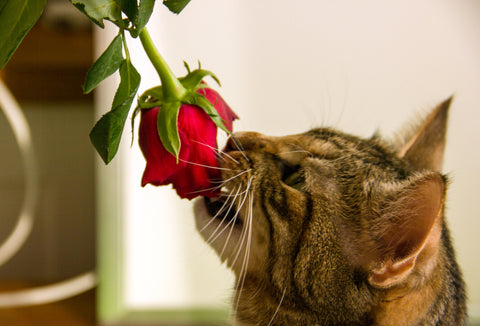Did you know that plants are in the top five categories of toxins that pets encounter? Unfortunately, some plants can be fatally toxic to cats. Luckily, if your cat has just eaten a rose, you can rest easy. The common rose is listed as non-toxic to cats by the ASPCA!
Are Roses Safe For Cats?
Roses are mostly safe for cats. The different parts of a rose, like the petals and leaves, are non-toxic to cats. But each rose has a thorny stem, and it may also have been sprayed with pesticides, which can be unsafe for our furry friends.
Rose petals, leaves, and stems
Upon sniffing the delightful fragrance of a rose, a cat may be tempted to taste it. Fortunately, roses are non-toxic to cats. So, you don’t need to worry about the petals, leaves, and stems of a rose poisoning a cat if they ingest it. But it may upset their stomach and make them feel sorry for themselves, as roses are likely something outside of your cat’s regular diet.
Thorns
Although the thorns of a rose are also non-toxic, a prick or scratch from a thorn could be painful and uncomfortable for a cat. Thorns can also hurt the inside of a cat’s mouth, lips, or face, especially if they chew on a thorny rose stem.
Pesticides

Roses may have been sprayed with chemicals to kill off insects and pests that eat them. These chemicals can be poisonous to cats if ingested, with painful indications. So, while roses themselves are mostly safe for cats, the pesticides that could be on them are not safe for our furry friends. Unfortunately, the pesticides can’t tell the difference between your cat and the pests for which it was designed to cause harm.
What To Do If Your Cat Eats A Rose And How To Prevent It
If your cat ate a plant that you’re concerned about, your veterinarian may first ask what type of plant it was. So, if you know that your cat has eaten a rose, this is a good starting point. Knowing that roses are non-toxic to cats is also important. More than this, vets working at the Pet Poison Helpline recommend that you:
- Stop your cat from eating more roses.
- Inspect your cat for physical injuries from thorns, like visible punctures and scratches.
- Look out for excessive drooling, pawing at the mouth, lethargy, and lack of appetite, which may indicate injury.
- Monitor your cat for symptoms that could result from eating parts of the rose, like vomiting and diarrhea, especially if they ate a lot of the rose.





